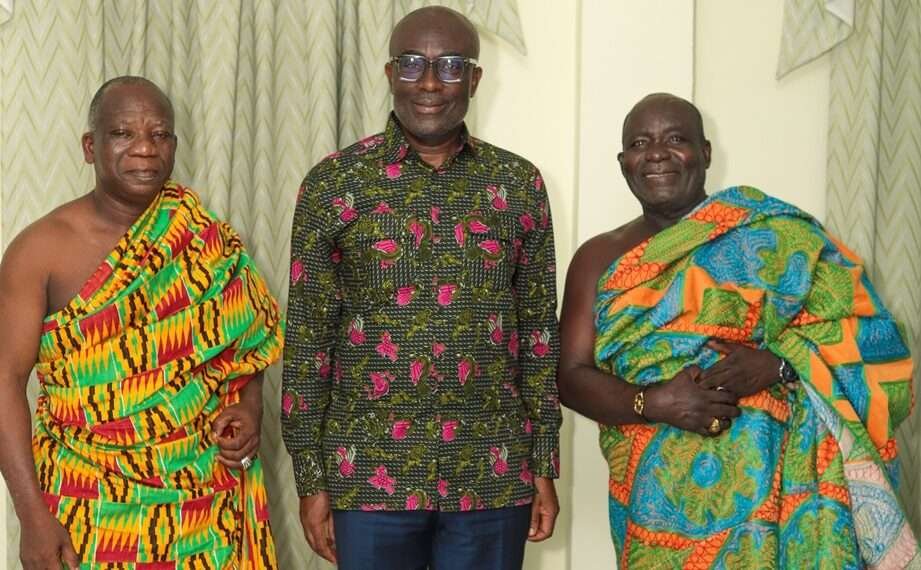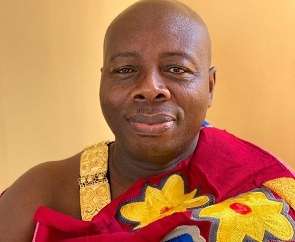The Western Regional House of Chiefs has expressed commendation for the newly appointed Chief Executive Officer of the Ghana National Petroleum Corporation (GNPC), Mr. Joseph Dadzie, for his respectful and proactive approach in paying them a courtesy visit without any formal invitation. The visit was aimed to introduce himself as the new head of the Corporation and establish a rapport with the traditional rulers of the region.
Mr. Joseph Dadzie, who succeeded Mr. Opoku-Ahweneeh Danquah on May 2, 2024, following Danquah’s resignation, was accompanied by his management team during the visit. His predecessor’s tenure had not seen a similar gesture towards the House of Chiefs, making this visit particularly noteworthy. Vice President of the House, Awulae Angama Tu Agyan, lauded Mr. Dadzie’s humility and respect, highlighting the significance of this initiative in fostering a strong and cooperative relationship between the GNPC and the traditional authorities.
“When K.K Sarpong left, someone came to replace him. We never saw him here, but see how quickly this new CEO [whom we are proud to call our son] has seen the need to visit us within a month of his appointment to interact with us.”
Awulae Angama Tu Agyan, Vice President of the House
In his remarks, Awulae Angama Tu Agyan pointed out that this visit by Mr. Dadzie, within a month of his appointment, was a positive step towards re-establishing crucial connections and seeking the Chiefs’ counsel on matters of mutual interest.
Awulae Angama Tu Agyan again emphasized that such gestures are vital for building a long-lasting and fruitful relationship between the GNPC and the Western Regional House of Chiefs. He expressed hope that Mr. Dadzie’s visit would be the first of many, fostering ongoing dialogue and cooperation.
“With your visit and introduction here today, we hope you will soon return to meet the full house and discuss more pressing issues that we have for your consideration. This will also allow us to share with you some of the challenges we are facing in the Region and explore ways of addressing them.”
Awulae Angama Tu Agyan, Vice President of the House
Awulae Amihere Kpaniyili, President of the Western Regional House of Chiefs, further praised Mr. Dadzie for recognizing the importance of visiting the Chiefs. He stressed the value of deepening the newly re-established relationship between the GNPC and the traditional leaders. “For you to come to the Western Region and realize the need to visit us is commendable. It shows the respect you have for us here,” he noted.
Strengthening Ties Between Traditional Rulers and GNPC
In response, Mr. Joseph Dadzie expressed his gratitude for the warm reception and promised to return for further engagements with the full house. He highlighted the impending commissioning of GNPC’s Operational Headquarters in the region as an opportunity for another visit. “As you all know, we are soon going to commission our Operational Headquarters here. When we come, I will use that opportunity to meet the entire house for further discussion,” he said.
Mr. Dadzie acknowledged the support of the Chiefs for GNPC and its staff, emphasizing the importance of paying homage to them. He assured the Chiefs that he would return with his board to address developmental concerns conveyed by the Regional Minister.
“Even before I came here, at the board level, we had discussed many of these issues, and we are strategizing on how to resolve them. The board has agreed that we will complete projects that have been stalled in the region.”
Mr. Joseph Dadzie, Chief Executive Officer of the Ghana National Petroleum Corporation (GNPC)
The impact of this visit extends beyond mere formalities. It symbolizes a commitment to collaboration and respect for traditional authorities, which is crucial for the socio-economic development of the region.
By engaging with the Chiefs, GNPC can better align its operations with local needs and concerns, ensuring sustainable development that benefits both the corporation and the communities within the Western Region. This initiative also sets a precedent for other corporate leaders to follow, fostering a culture of mutual respect and cooperation that is essential for national development.
READ ALSO: Ghana Edges Closer to Debt Relief as Bilateral Creditors Submit Final MoU





















